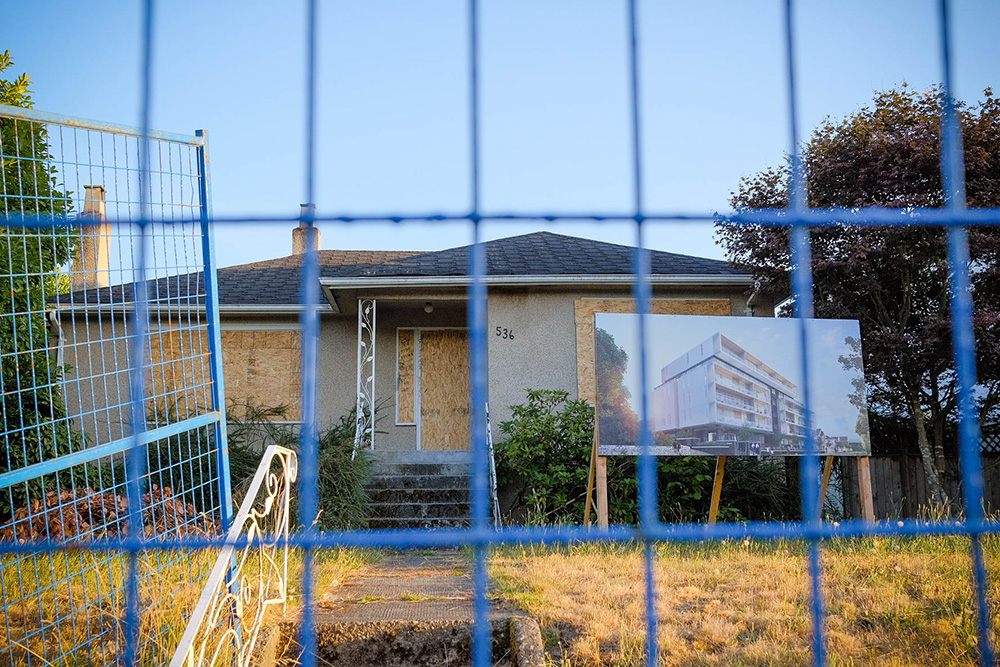Premier David Eby had over two years as B.C.’s housing minister. He’s now had about a month as B.C. premier to come up with effective affordable housing policies.
His latest plan — the Housing Supply Act policy — has met criticism from all quarters for relying on a false, supply-side economics principle.
Eby believes that forcing municipalities to build more housing will magically make it more affordable, despite evidence to the contrary.
More housing supply has failed to lower housing prices over the past five years and there is no reason to believe that bullying municipalities into increasing supply will succeed in the near future.
Federal housing advocate Marie-Josée Houle, in a report to the Privy Council, said “We’re losing housing that is affordable, faster than we can build it.”
GWL Realty Advisors Inc.’s vice-president Geoff Heu boasts that “everybody wants more Vancouver,” a sentiment echoed by superstar Vancouver realtor Bob Rennie. The 3,300 new housing units in Oakridge Park are being marketed at $2,500 per square foot in sales offices in Shanghai and Dubai.
It’s time for David Eby to be effective.
To make housing more affordable for local residents, Eby must increase the supply of affordable non-market housing. This requires bold and decisive government intervention into the housing market, a market that has failed on its own to create housing which most B.C. residents can afford.
What sticks can Eby use to effectively stop speculation and investor demand?
What carrots can Eby give to municipalities to encourage more affordable housing to be built?
Here are nine ways Eby can help solve the affordable housing crisis.
- A speculation tax with teeth to stop speculators.
- A property surtax deductible from income taxes to hit satellite owners.
- Stop REITS.
- More provincial money for the co-op and non-profit affordable housing sectors.
- Clean up BC Housing’s management.
- Use public land for the public good.
- Increase the requirement for 50 per cent affordable housing units on all up-zonings of multi-unit residential properties.
- Vacancy control and protection of existing affordable rentals.
- Reform BC Assessment for retail properties.
Slap a 50 per cent speculation tax on land profits to hit speculators and cool the overheated housing market — a tax with teeth that bites flippers, home hoarders and speculators.
Eby’s speculation tax, empty homes tax and two-year flipping tax are insufficient and have become "just the cost of doing business" for most investors. Use the revenues from the higher tax to build non-market affordable housing.
Slap a huge progressive property surtax of up to five per cent on high value homes over $1 million, deductible from provincial income taxes and federal income taxes, exempting Canadian pensioners, in order to hit satellite homeowners who pay no income taxes in Canada. Use the revenues to build non-market affordable housing.
In her recent report to the Privy Council, Houle noted that up to 30 per cent of purpose-built rentals in Canada are controlled by REITS, or real estate investment trusts, which have a mandate to maximize profits for shareholders through higher rents.
A REIT is a pooling of money from individual shareholder contributions into residential rental real estate properties that pays out a return on investment to its shareholders, based on the profitability of the rental properties. The more profitable the REIT, the higher the rents and the lower the costs. This means higher payout to shareholders, happier investors — and unhappier renters. This has to stop.
Eby must stick more financial limits on institutional investors who skew the demand for housing by restricting the activity of REITS, pension funds and global equity funds in the residential real estate market. Some sort of punishment tax is needed to stop the investor class from driving up housing prices.
Eby can provide more of the province’s record $5.7-billion surplus to fund the building of more affordable co-operative housing and more affordable non-profit housing.
Trim the top-heavy and slow-moving BC Housing management team to create a lean, mean housing machine that gets money out the door and into the ground faster, to build affordable housing projects. Institute management metrics to measure outcomes.
Use provincially owned and city-owned land at a $0 land cost to build affordable housing. A land cost of $0 gives any building project a financial advantage to provide a more progressive housing mix of one-third each for low, medium and high incomes. An example of this is south False Creek in Vancouver.
Eby can work with municipalities to increase the requirement for 50 per cent affordable units on all up-zonings of property. An up-zoning of land is a financial gift, like manna from heaven for a property developer.
Density bonuses must be tied to affordability to provide 50 per cent of the units for middle and low incomes. It’s a quid pro quo. The developer gets more profit, and the community gets more affordable housing.
Current city policies only require 20 to 30 per cent affordable units in each new multi-unit residential building. The sheer scale of profits from the high-end units can support the low-end units, and the middle can support itself — still giving the developer a decent but not exorbitant return on investment.
Our progressive income tax system works the same to balance income inequity, so this idea is not really new. It’s just being applied to housing.
Eby can prohibit rental tenants from subletting their homes for a profit through above-lease rates or short-term Airbnb rentals. Eby can also prohibit landlords from increasing rents between tenancies, except for the actual construction costs incurred for renovations. These actions could be implemented immediately to prevent rental units from being commodified and converted to unaffordable housing. This is the opposite of David Eby’s recent supply-side rental announcement which permit more rentals in strata buildings, but not more “affordable” rentals in strata buildings.
Lastly, the “highest and best use” principle used by BC Assessment for retail properties punishes small retail businesses by increasing their property taxes beyond what is reasonable to stay in the retail business. It kills retail streets by increasing vacancies. It taxes the air above the store, as if the air has already been built upon. This is not right.
Small businesses like hairdressers, drycleaners, restaurants, bars, grocery, clothing and hardware stores are needed to service residential neighbourhoods. Eby has the authority to reform this archaic principle and save retail streets from being hollowed out.
Unaffordable housing prices are ruinous for a city, particularly for young people with jobs who earn a good income — essential workers, such as nurses, teachers, police and firefighters who can’t afford to live in the city they serve.
Housing unaffordability also has enormous social and economic consequences for society, such as the inability to attract talented staff, millennials still living with their parents, couples delaying having children, more multi-generational households and more unsafe households.
The exodus to the suburbs necessitates more highways and contributes to the significant lack of social diversity in our city.
The current housing crisis is untenable for our society and requires bold, innovative and decisive political action from Premier David Eby.
Can Eby step up?
There is no silver bullet, but these proposals can at least start to make a difference. ![]()
Read more: BC Politics, Housing

















Tyee Commenting Guidelines
Comments that violate guidelines risk being deleted, and violations may result in a temporary or permanent user ban. Maintain the spirit of good conversation to stay in the discussion.
*Please note The Tyee is not a forum for spreading misinformation about COVID-19, denying its existence or minimizing its risk to public health.
Do:
Do not: